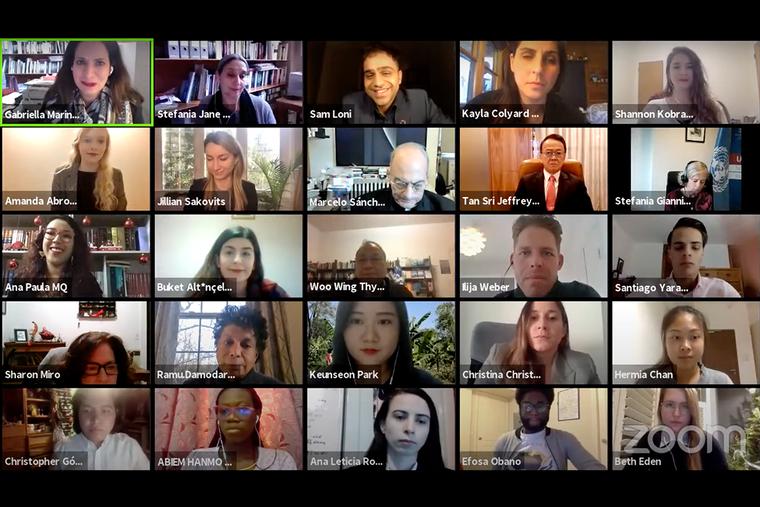Vatican Launches Education Collaboration with UN to Promote Sustainability and Gender Equality
The new initiative is jointly sponsored by Pope Francis’ Global Compact on Education and by Mission 4.7, an advisory group that promotes the education target of the UN’s Sustainable Development Goals.

Former United Nations Secretary General Ban Ki-moon, the economist Jeffrey Sachs, and the director general of UNESCO are among those speaking at the little-publicized launch of a Vatican-U.N. collaboration aimed at educating the world in sustainable lifestyles, gender equality and a culture of peace and nonviolence.
The Dec. 16-17 Vatican Youth Symposium, hosted by the Pontifical Academy of Sciences, is serving as the launch for a collaboration between Pope Francis’ Global Compact on Education initiative, which invites a new humanism based on a global change of mentality, and Mission 4.7, a U.N.-backed advisory group of civil and political leaders aiming to meet the educational target (numbered 4.7) of the U.N.’s Sustainable Development Goals (SDGs).
The Vatican said the symposium is focusing in particular on the need to promote a new kind of education, “one that will overcome the current globalization of indifference and the culture of waste.”
The SDGs are 17 interlinked goals drawn up by the U.N. General Assembly calling for urgent action to achieve “a better and more sustainable future for all.” The SDGs were created in 2015, the same year as Pope Francis published his environmental encyclical Laudato Si (On Care for Our Common Home), and their chief architect is Columbia University economist Jeffrey Sachs, a population control advocate and ally of socialist Sen. Bernie Sanders.
SDG number 4 strives for “quality education” and within that goal, target 4.7 aims to “ensure all learners acquire knowledge and skills needed to promote sustainable development, including among others through education for sustainable development and sustainable lifestyles, human rights, gender equality, promotion of a culture of peace and non-violence, global citizenship, and appreciation of cultural diversity and of culture’s contribution to sustainable development.”
Now in its fifth year, this week’s Vatican Youth Symposium has always served to promote the SDGs, even though targets 3.7 and 5.6 include “sexual and reproductive health services” — U.N. codewords for abortion and contraception.
Each symposium, including the current one, has been jointly organized by both the Vatican and the youth branch of the Sustainable Development Solutions Network (SDSN) — an organization also directed by Sachs and partially funded by the pro-contraception and pro-gender theory Bill and Melinda Gates Foundation (in 2016 it gave $1 million to the organization).
Ban Ki-moon, who was the U.N.’s secretary general from 2007-2016, is patron of the Mission 4.7 advisory group, along with Audrey Azoulay, the director general of UNESCO who is known for her promotion of “gender equality” and LGBT rights. Azoulay also took part in the re-launch of Francis’ Global Pact on Education in October.
Among Mission 4.7’s four co-chairs are Sachs and the chancellor of the Pontifical Academy of Sciences, Bishop Marcelo Sánchez Sorondo. Members of its “high-level advisory group” include Jack Ma, founder of the Alibaba Group, the multi-billion-dollar Chinese multinational, also known as China’s equivalent of the online retail giant, Amazon, and Jennifer Gross, founder of the Blue Chip Foundation that aims to eradicate poverty by helping people achieve self-sufficiency. Other members include the heads of Scholas Occurrentes, an educational program for creating a culture of encounter backed by Pope Francis.
Papal Video Message
In his Dec. 16 video message to the symposium, Francis thanked the participants for coming together, especially during a “year of suffering” due to COVID, in an act of hope that counters the “impulses of hatred, division and ignorance” through a “new wave of educational opportunities based on social justice and mutual love.”
The Pope added that at a time when the “pact for global education has broken down,” he was “pleased to see that governments have recommitted themselves to putting these ideas into practice by adopting Agenda 2030 and the U.N.'s Sustainable Development Goals, in synergy with the Global Compact on Education.”
He also praised the U.N.’s role and contribution in offering a “unique opportunity” to create “a new kind of new education,” and quoted St. Paul VI’s 1965 message of appreciation of the U.N. in which he lauded the institution for “teaching men peace.”
Regarding this new collaboration, the Pope expressed his hope that the Catholic Church and Mission 4.7 would work together “for the civilization of love, beauty and unity,” and asked that the elderly “who are the bearers of the most decisive human values” not be forgotten.
In a message to the participants, Ban Ki-moon said he was “proud to launch” Mission 4.7, calling it “a vital initiative to advocate for all learners to acquire the values, knowledge, and skills to promote global citizenship and sustainable development.”
Young participant Kimi Waite, a social justice educator and explorer, said she was “excited by the opportunity to attend” the Vatican symposium and to learn about Mission 4.7 from UNESCO and SDSN. The mission, she tweeted, “reminds us that education is not a global goal in isolation, but a means to achieve all of the other SDGs! Key to change and global sustainability.”
Waite was echoing comments Azoulay had also tweeted, that UNESCO “prioritizes Target 4.7 as a reminder that education is not only a goal in itself. It is also a means to achieve all the other #SDGs, an enabler of change.”
Bishop Sánchez, who in the past has justified working with pro-abortion figures such as Sachs by saying they do not express such opinions in the context of such events, said he was “very happy to collaborate” with Mission 4.7, “especially after this very important speech by the Pope, that recognizes the need to re-establish global and universal education.”


















